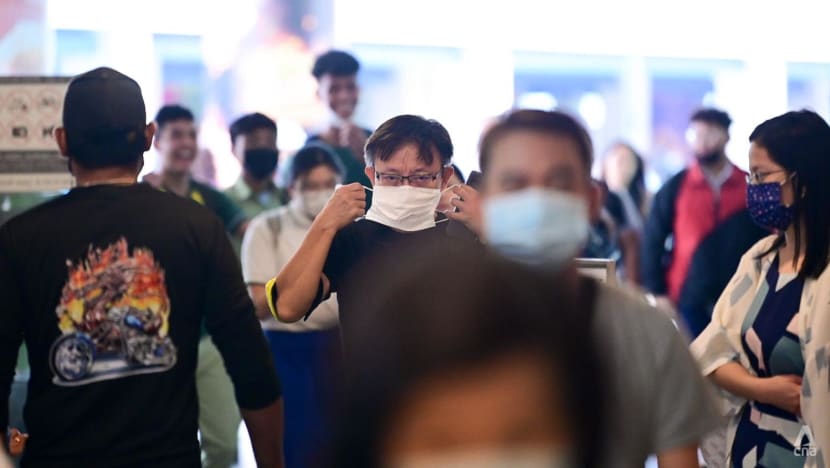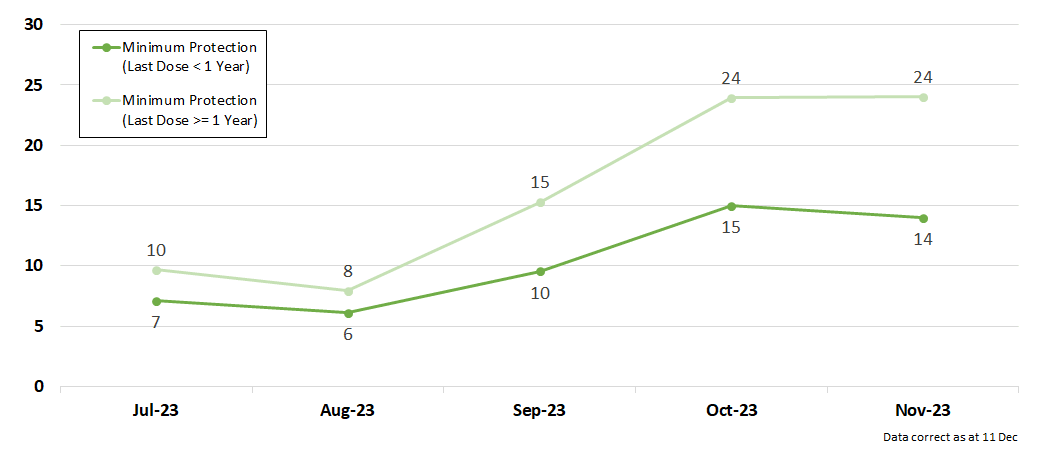Singapore ‘strongly encourages’ mask-wearing in crowded places amid rise in COVID-19 cases
The Ministry of Health says it has been working with hospitals on contingency measures such as ensuring adequate manpower and deferring non-urgent elective surgeries.


This audio is generated by an AI tool.
- The estimated number of COVID-19 cases last week rose by 75 per cent compared with the previous week
- The Health Ministry will provide daily infection figures from Dec 19
- A second COVID-19 Treatment Facility will open at the Singapore EXPO for stable patients who do not require intensive care
SINGAPORE: As Singapore's COVID-19 cases continue to rise, the Ministry of Health (MOH) said it "strongly encourages" people to wear a mask in crowded places even if they are not ill, especially indoors or when visiting vulnerable people.
The ministry said on Friday (Dec 15) that the estimated number of COVID-19 cases from Dec 3 to 9 increased to 56,043, a 75 per cent jump compared with 32,035 cases in the previous week.
The average daily COVID-19 hospitalisations rose from 225 to 350. The average daily cases in the intensive care unit rose from four to nine.
The vast majority of cases are infected by the JN.1 variant, a sublineage of BA.2.86.
"Based on the available international and local data, there is currently no clear indication that BA.2.86 or JN.1 are more transmissible or cause more severe disease than other circulating variants," MOH said in a media release.
Urging the public to exercise personal and social responsibility, the ministry said people who are unwell with acute respiratory infection symptoms should stay at home and avoid contact with others.
It added that those who are travelling should wear a mask at the airport, purchase travel insurance and avoid crowded areas with poor ventilation.
"We urge the public to seek medical treatment at a hospital’s emergency department only for serious or life-threatening emergencies," stressed the ministry.
"This will preserve our hospital capacity for patients who truly need acute hospital care and allow those with severe illness to receive timely treatment."
MEASURES TO MANAGE HEALTHCARE CAPACITY
The Health Ministry said it has been working with public hospitals for contingency planning, such as ensuring adequate manpower and deferring non-urgent elective surgeries to maximise bed capacity for urgent cases in need of acute care.
"In addition, hospitals are tapping on step-down facilities like Transitional Care Facilities and alternative care models like Mobile Inpatient Care@Home (MIC@Home) to ensure proper right-siting of patients," MOH said.
A second COVID-19 Treatment Facility will open this weekend at Singapore EXPO Hall 10, augmenting capacity at the existing facility at Crawfurd Hospital.
Together, they will be able to care for more than 80 stable COVID-19 patients who do not require intensive hospital care.
"If the need arises, the CTF (COVID-19 Treatment Facility) capacity at EXPO can be further increased," said MOH.
MOH WEBSITE TO BE UPDATED DAILY
From Dec 19, MOH will update its estimated COVID-19 case count daily on its website instead of on a weekly basis to provide the latest information during this period of rising infections.
It noted that as COVID-19 testing is no longer routinely required in DORSCON Green, the number of reported infections is expected to under-represent the actual situation.
Singapore moved its pandemic response down to code green on Feb 13, the lowest level under its four-tier Disease Outbreak Response System Condition (DORSCON) framework.
That was also when most COVID-19 restrictions such as mask-wearing on public transport were removed.
To get a more accurate estimate of the number of local COVID-19 cases, MOH said it takes into account the number of people who have symptoms of acute respiratory infection (ARI) at the polyclinics, the proportion of polyclinic ARI samples that test positive for COVID-19 for each epidemiological week, as well as the share of national ARI cases that are seen in polyclinics.
VACCINATION
The ministry reiterated that vaccination remains Singapore's primary defence against COVID-19 and it continues to be effective in preventing severe illness.
MOH said its analysis shows that hospitalisation rates are "considerably lower" among those who have kept up to date with their COVID-19 vaccination compared with those who have not.
From Jul 1 to Nov 30 this year, the monthly average incidence rate of hospitalisation and ICU cases per 100,000 population for those who did not keep up with their jabs was at 16.2.
This means that the group is 1.6 times more likely to have severe COVID-19 requiring hospitalisation or admission into ICU, compared with those who had kept up with their COVID-19 jabs.

"As immunity in the population wanes over time, we urge the public to keep their vaccination up to date to stay protected and maintain our collective resilience against COVID-19," said MOH.
Those aged 60 and above, people who are medically vulnerable and residents of aged care facilities are strongly advised to get the updated COVID-19 vaccine if their last dose was more than a year ago.
All individuals aged six months are above are also encouraged to receive the additional dose, particularly for healthcare workers and household members or caregivers of medically vulnerable people.
The updated COVID-19 XBB.1.5 Pfizer-BioNTech/Comirnaty and Moderna/Spikevax vaccines continue to be free at Joint Testing and Vaccination Centres, participating clinics and selected polyclinics.
Members of the public can refer to gowhere.gov.sg/vaccine for the nearest vaccination site and the types of vaccines offered.
Health Minister Ong Ye Kung said earlier this week that Singapore can withstand the current COVID-19 situation “quite smoothly” but people should continue to get vaccinated.
MOH added on Friday: "Our society has weathered several infection waves and emerged more resilient each time, and we can similarly withstand this wave with everyone’s cooperation.
"We urge everyone to play their part in protecting themselves and their families, especially seniors and medically vulnerable persons."

















